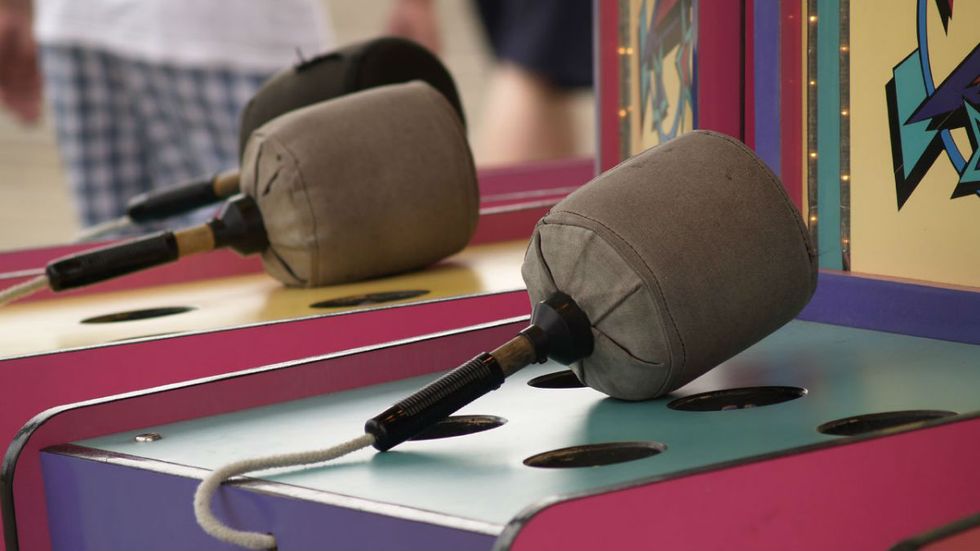
© 2024 Blaze Media LLC. All rights reserved.
Following the tragic deaths of four American servicemen in Niger, the Pentagon and members of Congress have called for further involvement in the west African country, along with an additional deployment into the Sahel region as a whole.
While details about the deaths of the four American Green Berets remain unknown, what also continues to be unclear is what exactly the American interest is in Niger.
Over time, the U.S. role in Niger has evolved from a counterintelligence and surveillance mission to an on-the-ground train and equip mission that involves sending U.S. soldiers into dangerous areas of the jihadist-populated nation. Like most Africa-based military operations since 9/11, this has happened with almost zero congressional oversight.
On October 4, U.S. military personnel Sgt. La David Johnson, Staff Sgt. Bryan Black, Staff Sgt. Jeremiah Johnson and Staff Sgt. Dustin Wright were tragically killed in a jihadi ambush attack. Almost three weeks later, the circumstances surrounding their death continue to be a mystery. Even without knowing the facts about their mission, some are already doubling-down on the war effort in Niger and the greater region.
“The war is morphing,” Senator Lindsey Graham said after meeting with Secretary of Defense James Mattis. “You’re going to see more actions in Africa, not less; you’re going to see more aggression by the United States toward our enemies, not less; you’re going to have decisions being made not in the White House but out in the field.”
While tinkering with rules of engagement might help to reduce allied casualties, it does not explain what exactly the American grand strategy in the region is.
The Pentagon justifies the mission in Niger as one that will help stabilize the country and the region as a whole. The military isn’t only involved in Niger. Today, the U.S. military has a presence in “virtually every African nation,” according to CBS news.
The Sahel region is a known hotbed for terrorist organizations like Boko Haram and the Islamic State. According to U.S. Africa Command (AFRICOM), American soldiers are in the region to “support African partners, alongside allies like France, with the goal of increasing the African nations' own security capabilities and stabilizing the region.”
Defense Secretary James Mattis added Thursday: "We call it foreign internal defense training, and we actually do these kinds of missions by, with and through our allies.”
On February 22, 2013, then-President Barack Obama deployed a few dozen military personnel to Niger to help with intelligence operations inside the country and with cross border operations against jihadist forces in Mali. Obama justified his order under the War Powers Resolution, which gives the Commander in Chief use of the military for up to 90 days without consulting Congress.
Over the past four-and-a-half years, the number of U.S. troops in Niger has swelled to around 1,000. There’s hardly been a legal justification made for the deployment of American soldiers into foreign lands. The War Powers justification expired four years ago. The mission is now seemingly acceptable under the post-9/11 Authorization for Use of Military Force (AUMF).
In addition to legal issues, it’s unclear what exactly the American interest is in Niger.
Year after year, Niger consistently ranks as one of the world’s poorest nations. With an estimated GDP per capita of $359 dollars a year, and 90% of Nigeriens without access to electricity, it’s hard to imagine that our presence in the country is stabilizing anything, other than abject poverty.
With such horrendous living conditions plaguing Niger, this means that the local and foreign jihadis who storm into the country, often armed to the teeth, do so with the backing of foreigners who are entirely disconnected from the nation. The only mega resource exported out of Niger is Uranium, but most of those revenues never make it into the hands of its citizens.
Therefore, the only way a terrorist group operating in Niger could ever actually threaten the United States is if they receive advanced weapon shipments from abroad. The vast majority of Nigeriens live their lives as subsistence farmers. Too busy avoiding starvation, they don’t have the time, nor the means, to pose an actual threat to the security of the United States.
Instead of playing a never-ending game of African whack-a-mole, U.S. decision-makers should refocus efforts towards cutting off the ideological and financial backers of the the global jihadist movement. If not for fundamentalist “Angel Investors” in Qatar, Saudi Arabia, and other oil-rich Gulf nations, along with policies that allow for misguided arms sales to untrustworthy Sharia governments, advanced weaponry would never get into the hands of these jihadist groups.
In addition to focusing on ideological warfare, it’s time to get serious about reprioritizing the immediate threats to the nation. For example, the same Pentagon leadership that is pushing for more troops in poverty-ridden Niger downplays the aspirations of an Iran that is close to obtaining a nuclear weapon. Secretary Mattis refuses to allow for commanders to target Iranian troops waging jihad throughout the Middle East, but demands that more soldiers are sent into the wilds of Niger.
It’s certainly a tragedy that groups like ISIS and Boko Haram threaten the well-being of innocents throughout the region. But using the American military to act as both a humanitarian force and human shields for the sake of a foreign, corrupt government does a disservice to our brave warriors. There are hundreds-of-millions of fanatical Islamists worldwide who seek the destruction of the United States. We simply do not have the capacity to target them all. If we want to win the war on global jihad, we must focus our resources on defeating the ideological threat and countering the immediate kinetic threats to the homeland.
Want to keep up with what's going on in Washington without the liberal media slant, establishment spin, and politician-ese?
Sign up to get CRTV’s Capitol Hill Brief in your inbox every evening! It’s free!
Want to leave a tip?
We answer to you. Help keep our content free of advertisers and big tech censorship by leaving a tip today.
Want to join the conversation?
Already a subscriber?
more stories
Sign up for the Blaze newsletter
By signing up, you agree to our Privacy Policy and Terms of Use, and agree to receive content that may sometimes include advertisements. You may opt out at any time.
© 2024 Blaze Media LLC. All rights reserved.
Get the stories that matter most delivered directly to your inbox.
By signing up, you agree to our Privacy Policy and Terms of Use, and agree to receive content that may sometimes include advertisements. You may opt out at any time.


